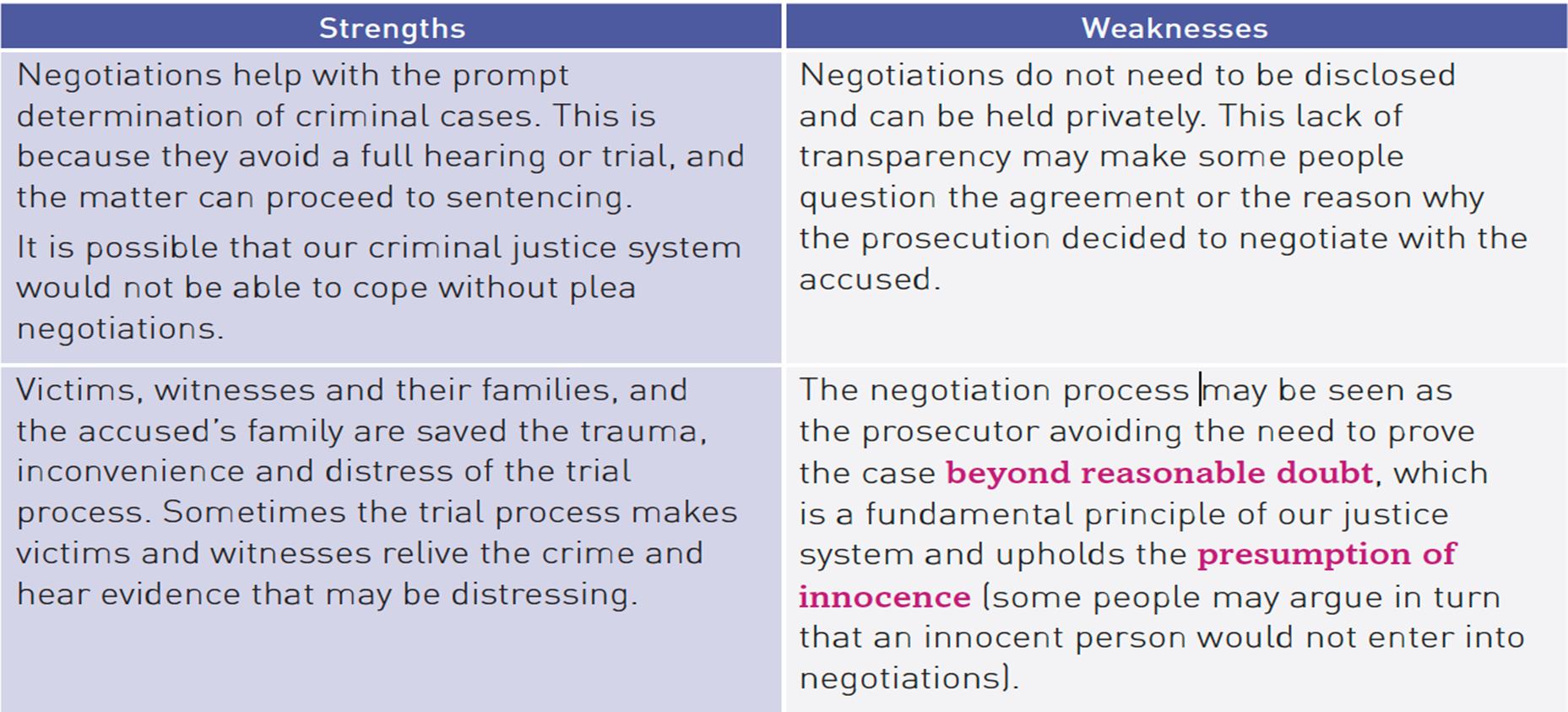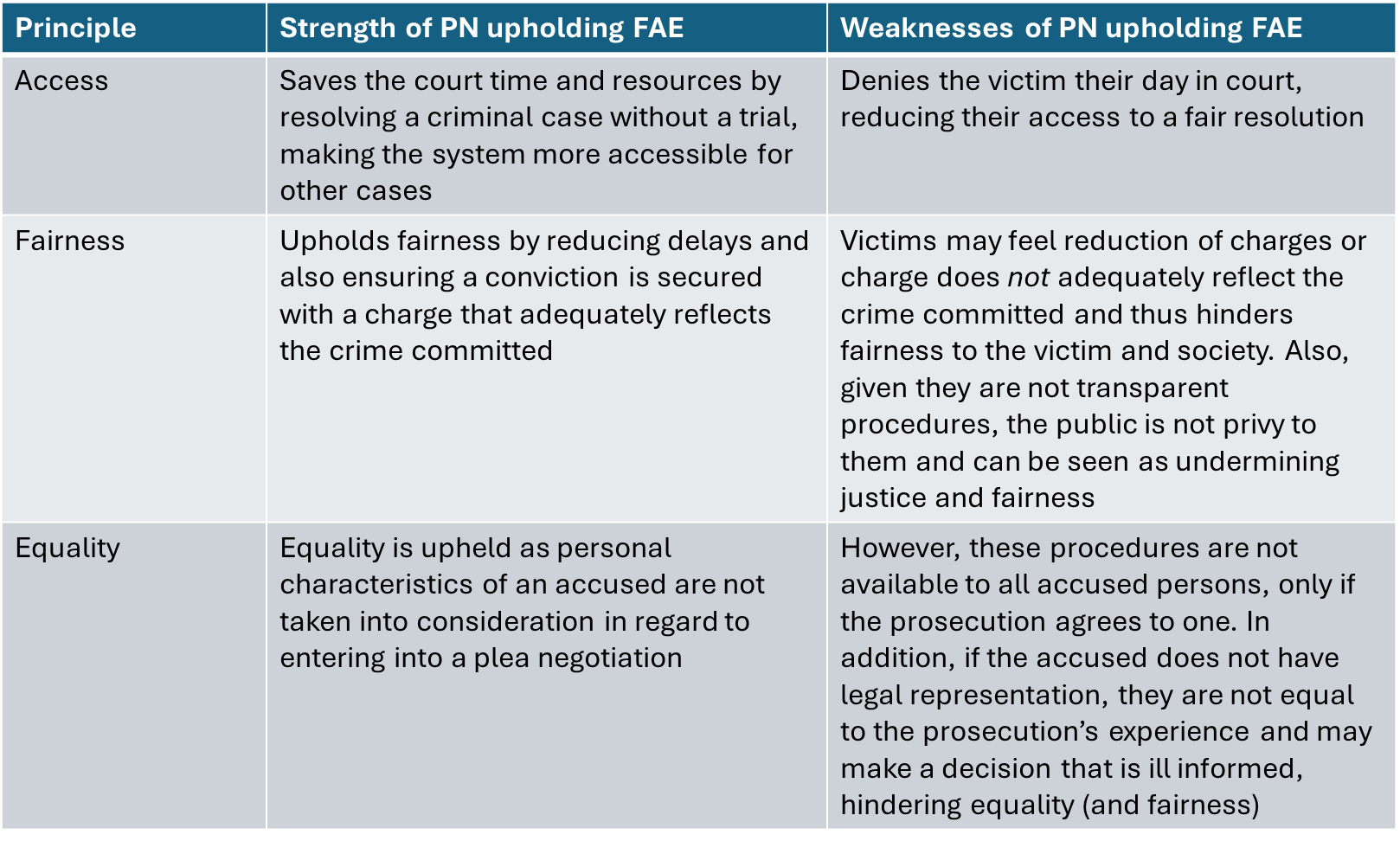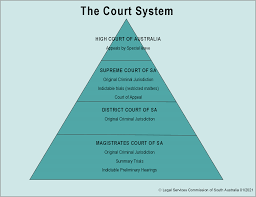unit 3 AOS1
the distinction between summary offences and indictable offences
Summary Offences: These are less serious criminal offences that are generally heard in the Magistrates' Court. They usually carry lighter penalties, such as fines or shorter imprisonment. Examples include minor theft or traffic violations.
Indictable Offences: These are more serious offences that can only be heard in the County Court or Supreme Court. They typically involve severe penalties, including longer imprisonment terms. An example includes serious crimes like murder or robbery.
•Indictable offences heard and determined summarily:•Serious offences that can be heard and determined as a summary offence if the court and the accused agree.
key principles of the criminal justice system, including the burden of proof, the standard of proof, and the presumption of innocence
Burden of Proof:◦ the party that has the responsibility to prove the facts of the case. The burden of proof lies with the person or party who is bringing the case forward. In a criminal case, this is the prosecution.
This principle establishes that the prosecution is responsible for proving the guilt of the accused beyond a reasonable doubt.
Standard of Proof:◦refers to the degree or extent to which a case must be proven. It is the strength of evidence needed and in a criminal case, it is beyond reasonable doubt. That is, the doubt must be sensible and realistic.
This refers to the level of certainty required for a judge or jury to convict the defendant, which is higher in criminal cases compared to civil cases.
Presumption of Innocence: A guarantee that an accused will be assumed to be not guilty until the charge has been proved beyond reasonable doubt
•This right is protected under the Charter of Human Rights and Responsibilities Act.
This fundamental principle ensures that a defendant is considered innocent until proven guilty, protecting their rights throughout the legal process. ·the rights of an accused, including the right to be tried without unreasonable delay, the right to silence, and the right to trial by jury:
the rights of victims:
including the right to give evidence using alternative arrangements:
In some criminal cases, a victim may be a witness in the case. If so, they may have to give evidence in
support of the prosecution’s case against the accused.
alternative arrangements: measures that can be put in place for witnesses in certain criminal cases (e.g. as sexual offence cases) to give evidence in a different way (e.g. via video link).
The types of alternative arrangements are as follows:
• The witness may give evidence from a place
other than the courtroom by means of closed-circuit.
television (or other like facilities) to enable
communication between that place and the
courtroom. The evidence will be recorded.
The purpose of alternative arrangements is to try to reduce the trauma, distress and intimidation that a witness may feel when giving evidence.
the right to be informed about the proceedings:
The Victims’ Charter recognises that people adversely affected by
crime should get certain information about the proceeding and about
the criminal justice system.
The Victims’ Charter requires investigatory agencies, prosecuting
agencies and victims’ services agencies to
provide clear, timely and consistent information about support
services, possible compensation entitlements and the legal assistance
available to persons adversely affected by crime.
the right to be informed of the likely release date of the offender.
A person who is a victim of a criminal act of violence may apply to be included on the Victims Register. The criminal acts of violence include stalking child stealing, kidnapping. Once a person is registered on the Victims Register, they may receive certain information about an offender who has been imprisoned, including notification of the release of the prisoner on parole at least 14 days before the release.
the right of the accused:
Right to be tried without unreasonable delay: An accused is entitled to have their charges heard in a timely manner. Any delay should be reasonable. Whether a delay is reasonable will depend on the facts of the case and surrounding circumstances.
•Source: Section 21 and 25 of the Human Rights Charter
Right to silence:
An accused has the right to remain silent when questioned or when asked to give information in the investigation. They also have the right to stay silent in a criminal proceeding and not be required to give evidence or call a particular witness. As a general rule, the exercise of the right cannot be used against them.
Common law and statute law (including the Evidence Act)
•The principles of justice during a criminal case
Right to trial by jury:
A person charged with an indictable offence is entitled to be tried by their peers. The jury will be made up of 12 members of the community. The right does not extend to people charged with summary offences.
Juries Act (for state indictable offences) and Section 80 of the Australian Constitution (for Commonwealth indictable offences).
·the principles of justice:
fairness:
all people can participate in the justice system and its processes should be impartial and open.
equality:
All people, engaging in the justice system and it processes should be treated the same way, but if the same treatment create disparity or dissaving adequate measures should be implemented.
access:
All people should be able to engage with the justice system and its processes on an informed basis.
·the role of Victoria Legal Aid and Victorian community legal centres in assisting an accused and victims of crime
strength | weakenesses |
Free legal information is available on VLA’s website (through its online chat and resources) to everyone, including victims, regardless of their income or means. This includes information about court processes, an accused person’s or victim’s rights, and basic legal principles. | The free legal information available on VLA’s website may not be enough for certain people, particularly those who are charged with an indictable offence and cannot otherwise get access to legal services in other ways. |
Free legal advice and assistance, such as through duty lawyers and grants of legal assistance, is given to eligible people who are most in need, including people in custody and First Nations peoples. The aim is to prioritise the most vulnerable in our society. | VLA does not have unlimited resources, so it must apply criteria to ensure that its funding is used appropriately and targeted to those who need it the most. It is possible that some people who cannot afford a lawyer may also not be eligible for legal assistance and will therefore be left without representation and unable to properly defend themselves. Victims of crime also do not get assistance such as legal representation for when they give evidence. |
Some legal information is provided in more than 30 languages. VLA’s website also states that its staff speak many languages and can organise a free interpreter. | The ability of VLA to meet demand for services depends, among other things, on continued funding. An increase in demand and/or constraints on VLA’s budget could mean that fewer people are eligible for legal aid. |
role; provides free legal information to the community, and legal advice and legal representation for people who cannot afford to pay for a lawyer
The objectives of VLA are to:
• provide legal aid in the most effective, economic and efficient manner
• manage its resources to make legal aid available at a reasonable cost to the community and on an
equitable basis throughout Victoria
• provide the community with improved access to justice and legal remedies
• pursue innovative means of providing legal aid to minimise the need for individual legal services in
the community
• ensure the coordination of the provision of legal aid and legal assistance information so that it
responds to the legal and related needs of the community.
Grants of legal assistance |
• VLA can grant legal assistance to people who cannot afford a lawyer |
Duty lawyer services |
• A duty lawyer is a VLA lawyer who is in court on a particular day and can help people who are in court on that day. • These lawyers are only available in the Magistrates' Court and Children's Court and not for indictable trials |
Free legal advice |
• Advice is given in person, through a video conference or over the phone. |
Free legal information. |
• VLA's website has free resources and information about criminal cases and other legal material. • These resources can also be accessed via the telephone |
income test:
Duty lawyers – the income test An accused meets the income test if they produce a current Centrelink benefit card (to show that theyare receiving welfare benefits from the Commonwealth Government) or pensioner concession cardto the duty lawyer. If they do not have one of these, they may still meet the income test if they sign adeclaration that shows they have limited income (e.g. their primary source of income is from welfare, or their weekly after-tax income is less than a certain amount). Duty lawyers are not available in the County Court or the Supreme Court. VLA has said its duty lawyer services are stretched, and duty lawyers are often limited in the time they can spend with a client
means test:
The means test is not the same as the income test. The income test is for accused people who need advice or representation from a duty lawyer on a particular day. The means test is for people who are seeking a grant of legal assistance (including help with preparing for a case, or representation in court). The means test considers the person’s income and other assets (such as houses, cars or savings). For example, if the accused person receives more than $360 per week in income after living expenses are deducted, then they are not eligible under the means test. If VLA has denied an accused person legal assistance, they can apply to have the decision reviewed by an independent reviewer. A decision made by the independent reviewer can then be appealed to the Supreme Court of Victoria.
other test:
Other tests Other than the means test, the accused person must satisfy other tests to be eligible for a grant of legal assistance. The tests depend on the type of legal matter and the seriousness of the offence. For example, depending on the case, VLA may assess the merits of the case, whether it would be in the interests of justice to fund the case, and whether there is any benefit or detriment to the accused or the public in granting legal assistance. This means it is not a straightforward process to ge a grant of legal assistance, and it often requires more than just showing a person has ‘no money’. In addition, the VLA has indicated that many people who do not qualify for legal assistance from services such as VLA also do not have enough money to pay for a lawyer themselves. These people are sometimes referred to as the ‘missing middle’. In its 2021–22 annual report, VLA noted that it continues to have discussions with governments to seek additional funding to meet the long-term challenges due to increased demand for legal assistance
·the purposes and appropriateness of plea negotiations
Plea negotiations are pre-trial discussions between the prosecution and the accused which aim to resolve the case by agreeing to the outcome to the criminal charges.
Potential outcomes from a plea negotiation:
•the accused pleads guilty to fewer charges, with the remaining charges not proceeding
•the accused pleads guilty to a charge, but an agreement is reached about the facts on which the plea is based
the accused pleads guilty to a lesser charge.
The prosecution offers an incentive to the accused person in exchange for them pleading guilty.
•In Victoria, this incentive for pleading guilty will be either:
–A reduction in charge to a less serious offence
–The removal of some charges in return for a guilty plea on another or others, in instances where the accused person is charged with multiple offences.
•Plea negotiations have two main purposes
•1.) to resolve a criminal case by ensuring a guilty plea to a charge that adequately reflects the crime committed
•2.) to achieve a prompt resolution to a criminal case without the cost, time, stress trauma (for victims) and inconvenience of a criminal trial providing fairness
•
•3.) to speed up proceedings – if there is no need to go to trial it is usually in the best interests of all parties, reducing court backlog for other cases

Principle | Strength of PN upholding FAE | Weaknesses of PN upholding FAE |
Access | Saves the court time and resources by resolving a criminal case without a trial, making the system more accessible for other cases | Denies the victim their day in court, reducing their access to a fair resolution |
Fairness | Upholds fairness by reducing delays and also ensuring a conviction is secured with a charge that adequately reflects the crime committed | Victims may feel reduction of charges or charge does not adequately reflect the crime committed and thus hinders fairness to the victim and society. Also, given they are not transparent procedures, the public is not privy to them and can be seen as undermining justice and fairness |
Equality | Equality is upheld as personal characteristics of an accused are not taken into consideration in regard to entering into a plea negotiation | However, these procedures are not available to all accused persons, only if the prosecution agrees to one. In addition, if the accused does not have legal representation, they are not equal to the prosecution’s experience and may make a decision that is ill informed, hindering equality (and fairness) |

·the reasons for the Victorian court hierarchy in determining criminal cases:
specialization:
court develop expertise because of their jurisdiction.
appeals:
high court are able to review decisions of lower courts.
jurisdiction:
jurisdiction:
the power of a court to hear a case in from the first time.
appellate jurisdiction:
the power of a court to hear a case in which a decision is being reviewed (on appeal)

·the roles of key personnel in a criminal case:
the judge or magistrate:
The judge or magistrate is one of the central figures in a criminal case. They oversee the case, act as an ‘umpire’ or ‘referee’ at trial or hearing, and make sure that the court procedures are carried out in accordance with the court’s rules to ensure that the parties are treated fairly. The judge (or magistrate) must act impartially, not favour any side, and must have no connection with the prosecution or the accused.
Judges and magistrates in Victoria are appointed, not elected. To be eligible to be appointed a judge, a person must be under the age of 70 years and either have experience as a lawyer, or already be a judge or magistrate. To be eligible to be appointed as a magistrate, a person needs to have completed a law degree and have at least eight years’ experience as a lawyer.
Judges and magistrates have a number of roles in a criminal If the accused is charged with a summary offence, the offence will generally be heard in the Magistrates’ Court, and the magistrate will have the primary role in the case. A judge in the higher courts will not be involved in the case. If the accused is charged with an indictable offence, the offence will generally be heard in the County Court or the Supreme Court, and the judge will therefore have a primary role in the case.